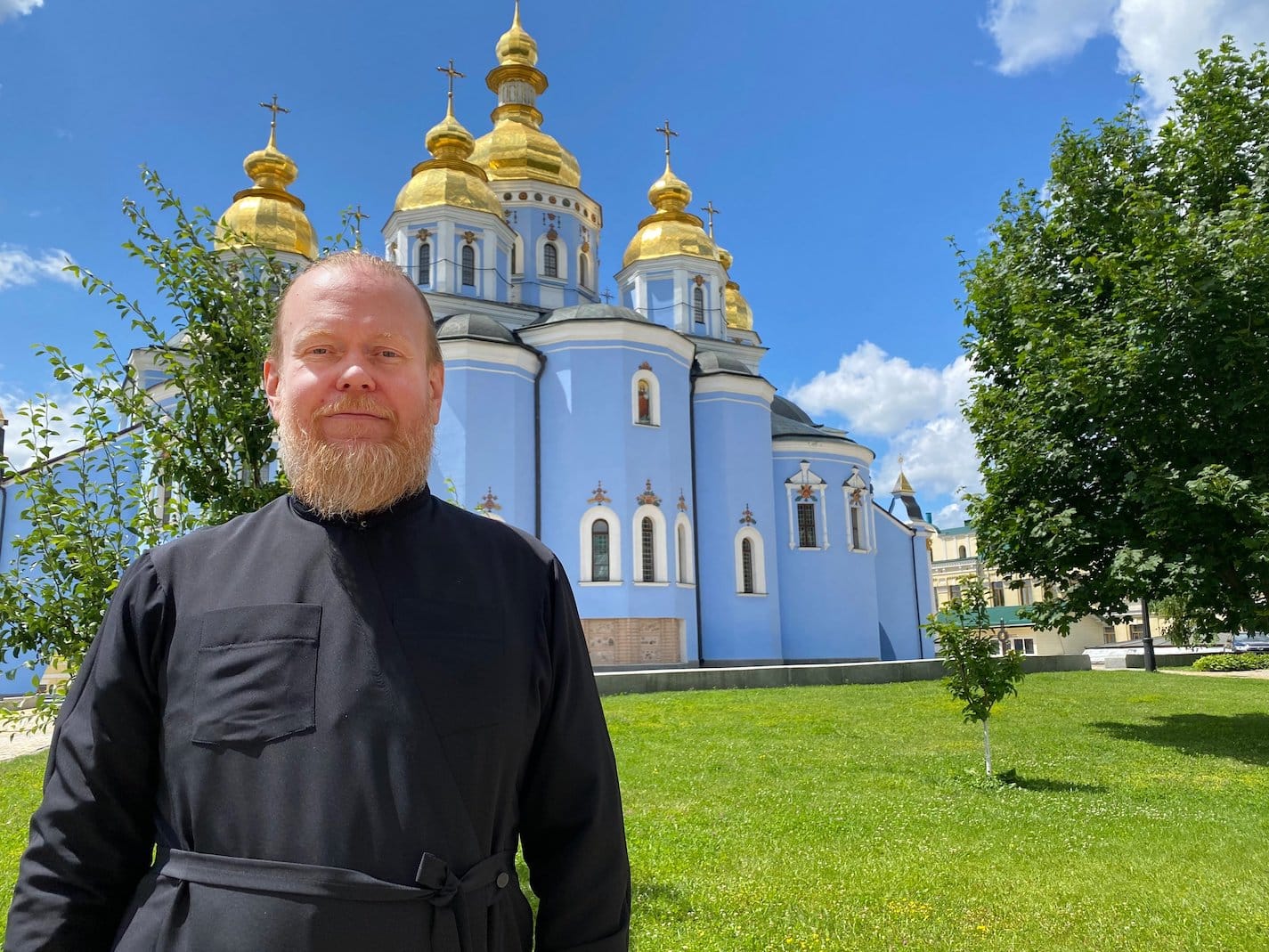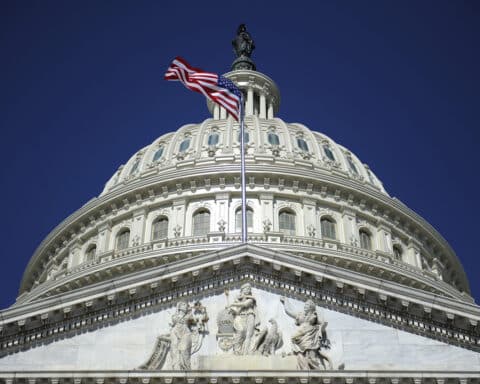KYIV, Ukraine (OSV News) — In late June, OSV News traveled to Kyiv to speak with Archbishop Yevstratiy Zorya, deputy head of the Orthodox Church of Ukraine’s Department of External Church Relations and a professor at the Kyiv (Orthodox) Theological Academy.
Close to 80% of Ukraine’s population identifies as Orthodox, but that affiliation has become increasingly complex in light of Russia’s decade of aggression against Ukraine, which began with 2014 attacks on the Donbas region and the attempted annexation of Crimea and became a full-scale invasion on Feb. 24, 2022.
In January 2019, Ecumenical Patriarch Bartholomew I of Constantinople — the “first among equals” of the Eastern Orthodox churches — formally recognized the independence of the Orthodox Church of Ukraine. A few months prior, he had restored Metropolitan Filaret, head of the Ukrainian Orthodox Church-Kyiv Patriarchate — an independent Orthodox church in Ukraine — to full communion. In response, the Russian Orthodox Church, led by Patriarch Kirill, a close ally of Russian President Vladimir Putin, severed communion with Constantinople.
This interview has been edited for clarity and length.
The Kremlin and the Russian Orthodox Church
OSV News: What is the relationship between the Kremlin and religious denominations, particularly Christian churches, in post-Soviet Russia?
Archbishop Zorya: First, you must understand that the Soviet totalitarian attitude towards society, including religious institutions, has unfortunately returned to Russia.
Russia itself is a place of terrific alcoholism, a terrific amount of divorce, a terrific amount of domestic violence.
The Soviet Union was officially an atheistic state and used existing religious organizations (for state purposes). Now, we can see that Putin’s regime has not just restored that previous system of control, but also that the Kremlin has replaced the former Bolshevik ideology with a constructed one, (alleging) “Christian, conservative, traditional values.”
Putin and the Kremlin regime try to use the ideas of conservatism and the protection of Christian values as a kind of curtain, behind which they do the total opposite. Russia itself is a place of terrific alcoholism, a terrific amount of divorce, a terrific amount of domestic violence. (Putin’s use of Orthodox Christianity) is just a way to garner support from naive, inexperienced people who really believe that Russia is a stronghold of Christian values against a godless West.
Putin’s regime uses religious organizations, with the Russian Orthodox Church as the main one. Even the main Muslim and Protestant unions are under the control of the Kremlin.
A few years ago (in 2016), Russia adopted its so-called Yarovaya Law (a measure designed to repress dissent and severely restrict religious activities, particularly of smaller groups). This law is an amendment to different Russian laws about religion, (with the result that) every particular aspect of religious life and activity of a particular congregation is now under the control of the government.
Without state registration, it is not possible to have any religious activity, such as collective prayers or services. If you would like to have classes for children, or a religious festival, or an evangelization program — for any religious activity outside your basic place (of worship), you must inform the local representatives of the government. They must provide you their permission for such activities. This is the general system of interaction between Russia as a state and religious communities.
OSV News: But what about the Russian Orthodox Church, which has enjoyed the favor of both Putin and the Kremlin?
Archbishop Zorya: The Russian Orthodox Church is not just under the control of the government; it is part of the government.
The current leader of the Moscow Patriarchate, Patriarch Kirill, is more an official of the Kremlin regime than a real Christian leader. (Ed. — As the former Vladimir Mikhailovich Gundyayev, Patriarch Kirill was reported to have worked with the Soviet Union’s KGB intelligence service, particularly with respect to the World Council of Churches during the 1970s.)
And we have clear evidence this is true: (Russian Orthodox Church leaders) not only keep silence during this terrific, inhumane aggression of the Russian Federation against Ukraine, but they express full support for it. Even worse, (Kirill) has publicly stated during his sermons that those who give their lives for the motherland, for Mother Russia, will by their blood banish all their sins.
It’s not Christianity. It’s more comparable with the doctrines of political and terroristic (sects) of Islam, (which assert that) “if you blow up unbelievers of our true religion, you will immediately go to paradise.”
Weaponizing the Orthodox Church in Ukraine
OSV News: How has Russia carried over this policy into the areas of Ukraine it currently occupies?
Archbishop Zorya: The policy includes the Russian Orthodox Church in Ukraine. They use the institutions, clergy and communities in their system … as instruments of deepening and justifying occupation. They use the spiritual power and authority of local representatives of the Russian Orthodox Church in the occupied territories as instruments of impact.
For example, they organize public prayers for Russia and its soldiers, blessing Russian soldiers as liberators — because in official Russian propaganda, everything (that Russia is doing) in Ukraine is for “liberation.” They try to liberate Ukraine from Ukrainians.
They understand the importance, especially among the local community, of the priest, pastor or any kind of spiritual leader. Such persons are able to organize or inspire resistance against the occupation, against Russia. So (Russia) tries to scare them with arrest or force them into collaboration.
They replace local spiritual leaders with those who are obedient to Russian authorities. We saw this in Crimea, where Russians forced Mufti Emirali Ablayev (leader of the Spiritual Directorate of Crimean Muslims and a former opponent of Russian occupation) to cooperate, and he transferred to their side. At the same time, as a first deputy to him, Russia sent a Muslim cleric from (the Russian Republic of Tatarstan), who has the real administrative power.
The general attitude of the Russian government to all other religious communities is to treat them as instruments of the enemy. For them, Protestants are agents of the West. (Russia) persecutes Roman and Greek Catholics in the occupied territories.
In Roman Catholic parishes, before the occupation of Crimea, there were many priests who had foreign citizenship, especially Polish. When the Russians occupied Crimea, these priests were told, “You have no right as a foreign citizen to be on the territory of the Russian Federation. You must leave.” They replaced local Catholic priests with ones sent from Russia.
These are not isolated cases but a general policy. Russia’s “legal ground” for persecution is its registration requirement for religious activities.
The single instrument of law in Russia is the will of those who have power.
As the Orthodox Church of Ukraine, we do not register our communities in occupied areas according to Russian law, because such registration would mean that we recognize Russia as legally ruling. Because we have no registration, they use all available mechanisms in Russian law against our religious activities.
Another important point to note about religious persecution is that in general, Russia has no law. What they have under that title is essentially just paperwork. Law has become an expedience to maintain power.
The single instrument of law in Russia is the will of those who have power. In Russia, they have no courts. Yes, they have a judicial system that consists of some buildings with people bearing the title of judge, but in English you would call it a “kangaroo court.” If your legal rights are violated, and you come to court and ask to protect them according to Russian law, you will never find protection. There is only one exception: if you have someone powerful who will protect you. The state as an entity is never held accountable.
‘We are protected by God’
OSV News: How are you and your flock holding up as the war (starting in 2014 with the attacks in Donbas and attempted annexation of Crimea) approaches its tenth year?
Archbishop Zorya: We in Ukraine really feel that we are protected by God. And many miracles have happened. Ukraine’s survival until now is really a miracle, because God is able to strengthen a small David against a scary, huge Goliath.
We know that the truth is on the side of the Ukrainian people. We don’t want anything that belongs to others. We are just trying to protect our own.
We’re fighting for the future of the next generations, and truth is on our side. Where there is truth, there is God. And where there is God, there is victory.





